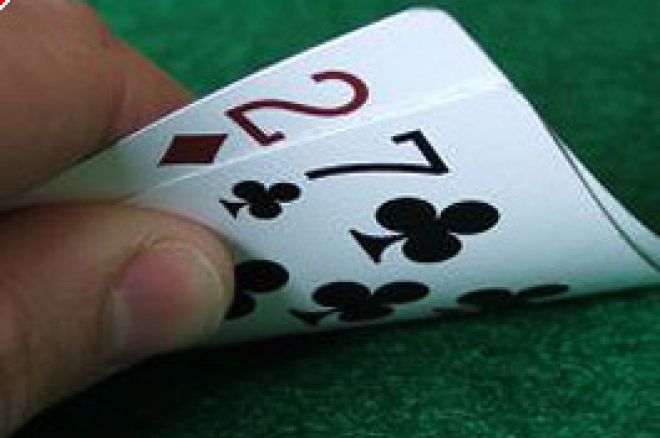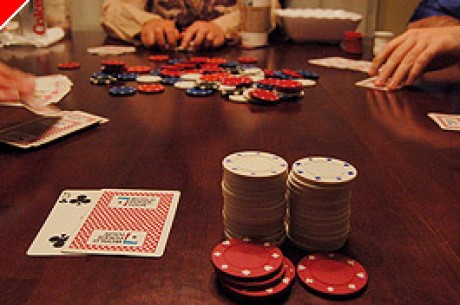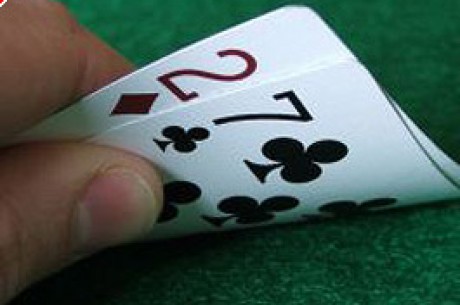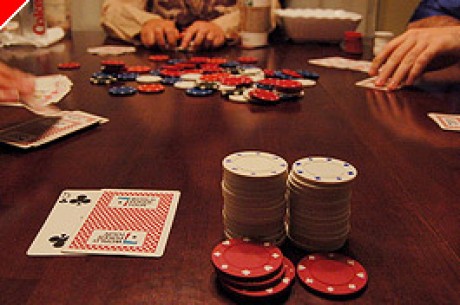The 'Other' Games of Poker: David "Drizz" Aydt on Pot Limit Omaha/8

While most poker players were preoccupied with the hold'em craze, poker blogger David "Drizz" Aydt took his game in a different direction and found his niche at pot-limit Omaha 8 or better. When he's not busy as the father of two small children Aydt can be found in the thick of the mid-limit PLO8 action on Full Tilt and online at his blog "Nickle and Dimes." He joins us this week at Poker News to impart upon us some thoughts on his game of choice.
Nicole Gordon: Amidst the poker boom and the ensuing hold'em craze, you instead gravitated toward online PLO8 and made the game your specialty. Why did you take to the game so strongly and how did you develop your skills?
David Aydt: I've always been a "cautious" player. OK, I was a rock. So with the help of (fellow poker blogger) Felicia Lee, I found a game where I could feel safe about my bets, yet satisfy the gambler in me. It is very easy to play and profit from PLO8 by just playing the nuts over and over. But, I've learned by watching several higher stakes players that by taking more calculated risks (thus increasing your variance) and making more raises with just draws, your potential profit increases greatly.
NG: What is the biggest concept for a player just starting to approach PLO8 to understand? What are some of the most common "newbie mistakes" that you witness at the tables?
DA: Playing for just low end of the pot. There are times when it is correct to do so, but many players at times will play for half the pot and not take into account that, best case scenario, they get their money back, and worst case they will get quartered or "counterfeited" and lose the entire pot or lose all the bets they called while chasing.
NG: O.K. Time to confess. Are you a multitabler? If so, do you feel that it helps or harms your game?
DA: I'm "one of those guys" that can slow down action while I'm chatting on IRC, holding my kid's bottle, watching "Bull Durham", and playing seven different poker games on two sites. It doesn't take my Excel spreadsheet to tell me that my most profitable times/sessions are ones when I'm only playing one or two tables and it's after I've read "Curious George Goes to the Hospital" for my son again. With PLO8 you have four cards and twice the amount of information to process while looking at a board versus hold'em. I don't suggest multi-tabling beyond two games unless you have played enough that you can instantly count your outs and are able to play aggressively despite not paying full attention to the action. I am a former gamer and I'm used to making quick decisions based upon the action in front of me. You'll find many other multi-tablers with gaming backgrounds as well.
NG: Here's a situation I run into all the time. Say I'm in a three-way pot in position with the Ah-2c-4h-Kd. I flop two huge draws-- the nut low draw and the nut flush draw when it comes down the 3d-8h- Jh. Action is checked to me, I bet the pot and get one call and one fold. Now, the turn comes the Qs, a big ol' brick that misses both draws. My opponent leads the turn with a pot sized bet. What's your move here?
DA: Putting the opponent on two pair or maybe a set from his bet, he likely won't pay you off if you hit your draw (any heart, any ten, any five) by calling and betting the river. If you call and miss, you've just cost yourself a pot sized bet for no information, hence the old adage "bet, raise, or fold, don't call." This is a situation where there's no "right" or "wrong" way to play it. If you want maximum profit, you should re-pot it on the turn and start praying to the poker gods. If you fold, statistically it may be correct, but if you aren't pushing your draws in Omaha you're missing out on the concept of the game.
NG: Let's say you're in a multi-way pot holding the Ah-2s-Jh-Jc and the flop is 3s-3c-5s. With a vulnerable overpair and the nut low draw, what are you thinking about facing a pot sized bet? How does your action change if your opponent is a known aggressor? A total donkey?
DA: My first thought is: What am I drawing to? Two jacks, Four fours for a nut low. Also, I have a "naked" low draw, meaning any ace or deuce on the river and I'm left holding air after a probable second pot-sized bet on the turn, so I'm only looking to the fours as being gin cards for the low. A multi-way pot with several callers probably indicates you're up against another A-2-X-X, so this is where you need to have notes. Against a total donkey, I'd look to him/her to have no chance at the high and no counterfeit protection (like our hand��). A known aggressor or decent player will usually show you at least a trey if not A-2-3 meaning you're left drawing to two outs for a scoop. Everything else ends with you losing the whole pot or getting quartered. Unlike limit O8, getting quartered or 1/6th means losing half your stack or more, not just a couple of BBs. I'd find a fold here most of the time unless I have good notes on my opponent(s) .
NG: Here's a hand from a game on Full Tilt I played a few weeks ago. There were several limpers and I got a free flop from the BB with the 2d-3d-Kc-Qc. The flop came down the 4d-7d-8d. I've flopped a baby flush and the 3rd nut low. I checked, since I was out of position and had multiple people behind me. A late position limper potted it, the button folded, and the SB folded. With the action back to me, I felt lost in the hand. Call or fold? Would leading out and taking a stab at the pot have been a better choice?
DA: A bet gives you information. Now you're out of position with a vulnerable hand. PLO8 is about controlling the pot size for draws and getting paid off when they hit (as much as I hate it when a nut flush/straight gets run down by a paired board). A check-call down may be correct here since you didn't bet and allow the LP player to re-pot it thus making the pot too big to attain a cheap showdown (which should be your goal for this hand).
NG: Another situation I find tricky is flopping an underfull ("Bottom" full house) Let's say I get a walk in the BB with the Qh-2d-7c-7s and the flop comes down the Ad-Ac-7d. I have no low, but probably have the best high right now. However, if I'm facing multiple limpers, chances are at least one of them has an ace and could easily outdraw me on the later streets. How would you play this hand on the flop? How would your play change if you had even a weak low draw to go with the underfull?
DA: The underfull or underfill is THE most expensive hand in PLO8 besides the flopped straight. Several limpers suggest that the other two aces are out there, but not likely in one person's hand.
Meaning:
a) you're already drawing dead to an A-7
b) you need to dodge the other three cards in both of their hands
c) you need to dodge two more low cards to half the pot
Now like you mentioned, even if you did not have a low draw to go with it (2-3, 2-4, 2-5) you should definitely pot the flop, but fold to resistance in most cases since you're wide open to redraws, have only invested 4 to 5 small bets, and have a chance to pickup a quick pot. It is NOT weak-tight to fold an underfull in Omaha. Bad players (and I'm guilty when stubborn) will always stack off with a full house. If you know you're beat, give it up, and look for a better spot.
NG: Any final thoughts, Drizz?
DA: Big bet Omaha games are extremely hard on the psyche, even after two years it's tough for me to come to terms with the "bad beats" immediately. Once you realize that you will get outdrawn at times, just like in Texas hold'em, your odds of becoming a profitable player multiply ten fold. Realizing that you're gambling and not playing chess is a big help as well








